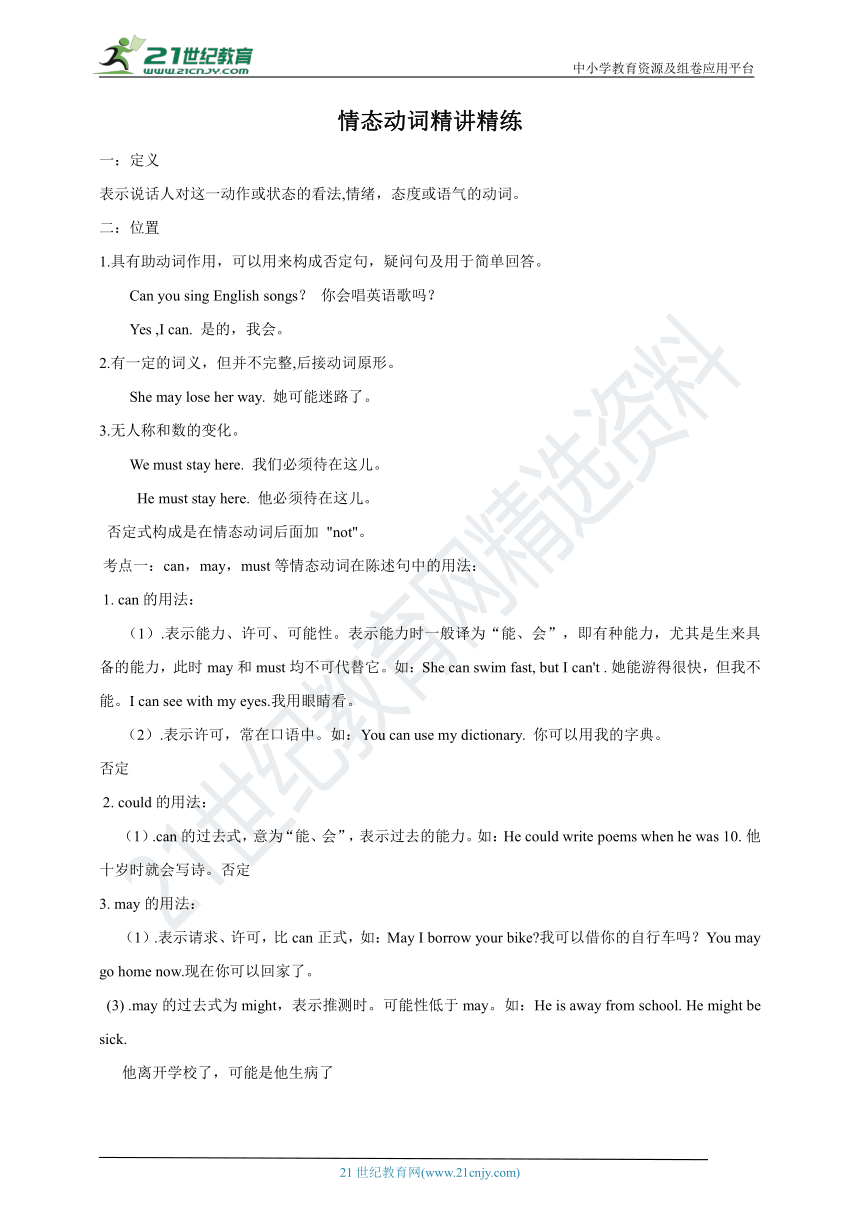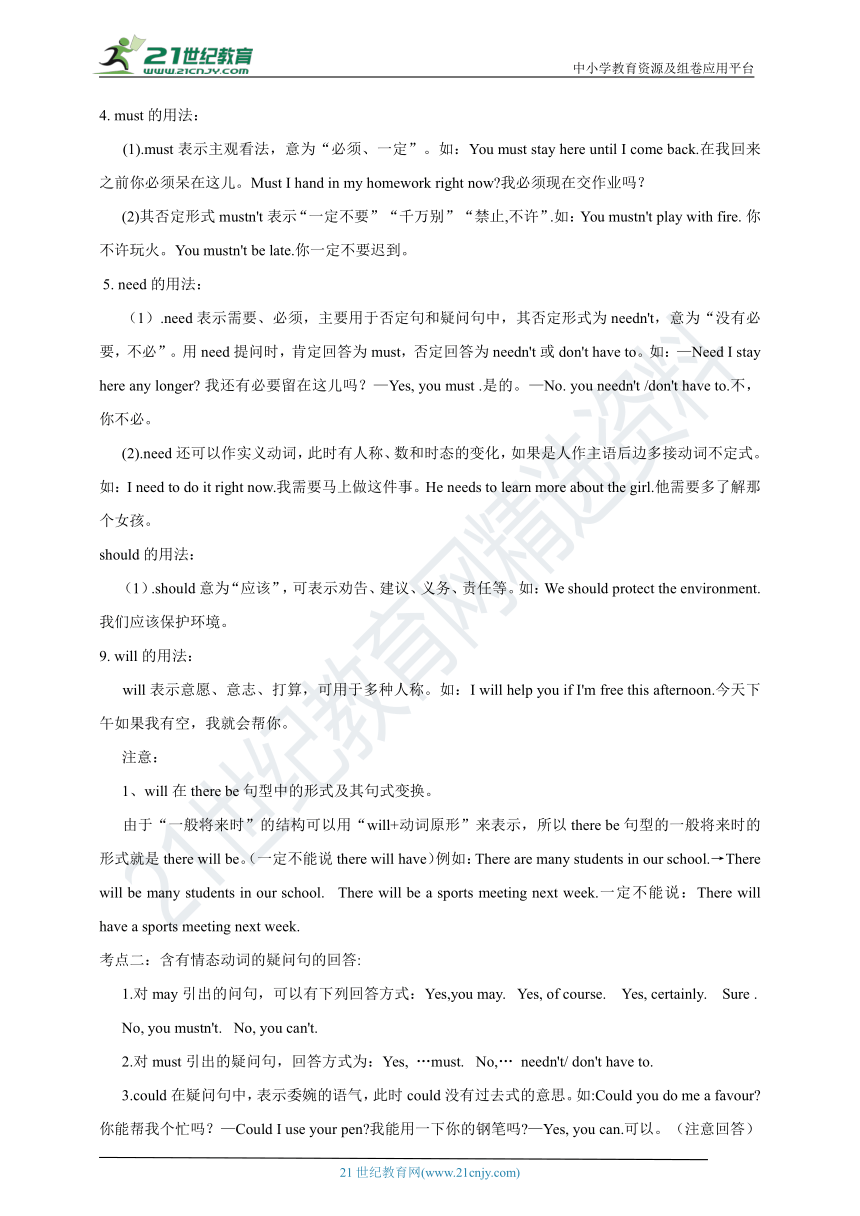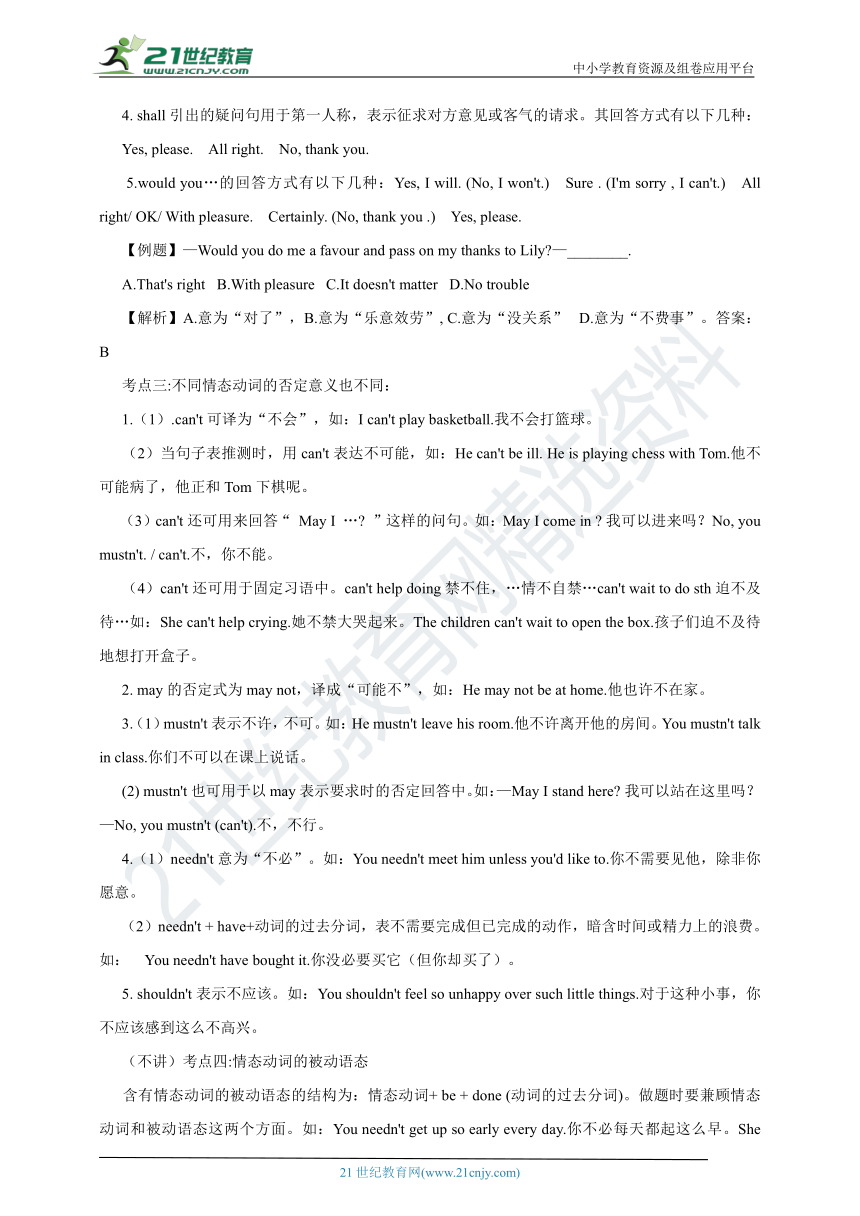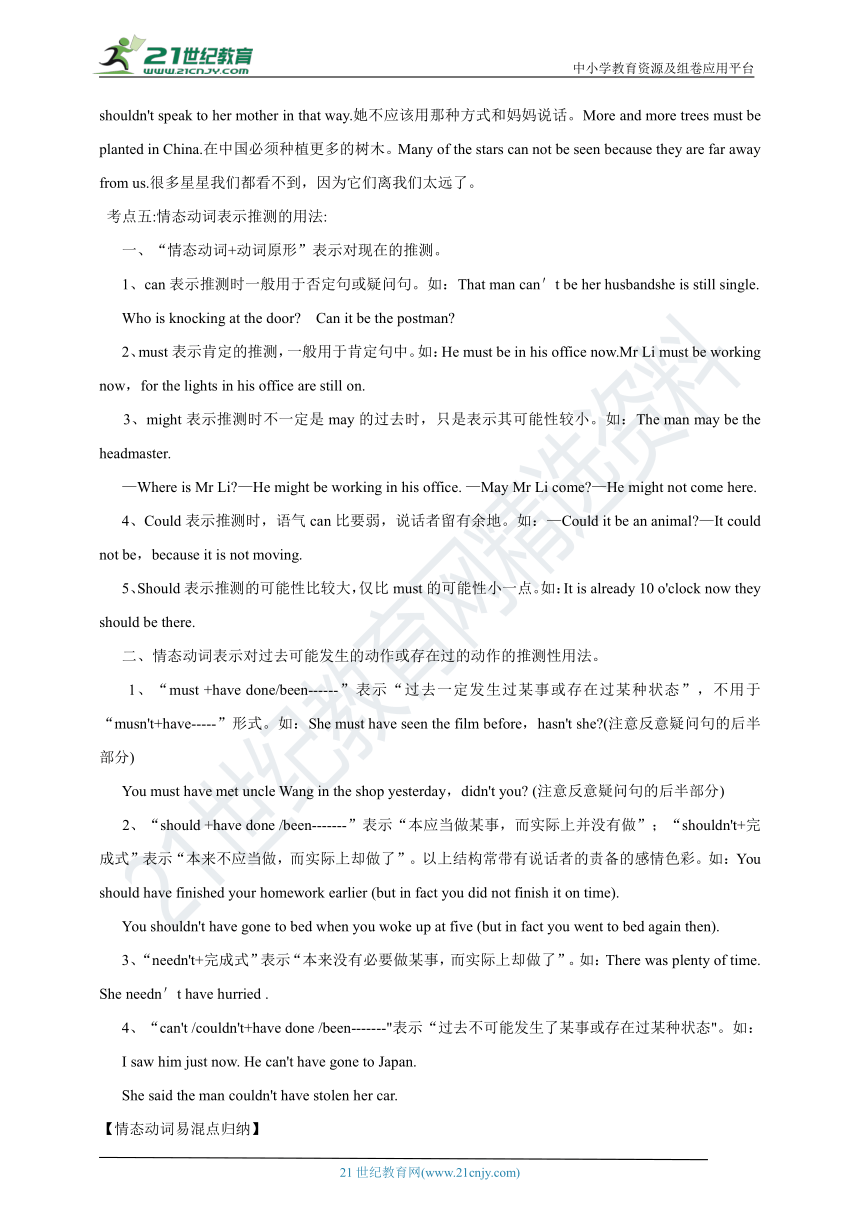2022年中考英语二轮语法专题精讲学案:情态动词
文档属性
| 名称 | 2022年中考英语二轮语法专题精讲学案:情态动词 |

|
|
| 格式 | zip | ||
| 文件大小 | 1.3MB | ||
| 资源类型 | 试卷 | ||
| 版本资源 | 通用版 | ||
| 科目 | 英语 | ||
| 更新时间 | 2021-12-02 17:31:00 | ||
图片预览




文档简介
中小学教育资源及组卷应用平台
情态动词精讲精练
一:定义
表示说话人对这一动作或状态的看法,情绪,态度或语气的动词。
二:位置
1.具有助动词作用,可以用来构成否定句,疑问句及用于简单回答。
Can you sing English songs? 你会唱英语歌吗?
Yes ,I can. 是的,我会。
2.有一定的词义,但并不完整,后接动词原形。
She may lose her way. 她可能迷路了。
3.无人称和数的变化。
We must stay here. 我们必须待在这儿。
He must stay here. 他必须待在这儿。
否定式构成是在情态动词后面加 "not"。
考点一:can,may,must等情态动词在陈述句中的用法:
1. can的用法:
(1).表示能力、许可、可能性。表示能力时一般译为“能、会”,即有种能力,尤其是生来具备的能力,此时may和must均不可代替它。如:She can swim fast, but I can't . 她能游得很快,但我不能。I can see with my eyes.我用眼睛看。
(2).表示许可,常在口语中。如:You can use my dictionary. 你可以用我的字典。
否定
2. could的用法:
(1).can的过去式,意为“能、会”,表示过去的能力。如:He could write poems when he was 10. 他十岁时就会写诗。否定
3. may的用法:
(1).表示请求、许可,比can正式,如:May I borrow your bike 我可以借你的自行车吗?You may go home now.现在你可以回家了。
(3) .may的过去式为might,表示推测时。可能性低于may。如:He is away from school. He might be sick.
他离开学校了,可能是他生病了
4. must的用法:
(1).must表示主观看法,意为“必须、一定”。如:You must stay here until I come back.在我回来之前你必须呆在这儿。Must I hand in my homework right now 我必须现在交作业吗?
(2)其否定形式mustn't表示“一定不要” “千万别” “禁止,不许”.如:You mustn't play with fire. 你不许玩火。You mustn't be late.你一定不要迟到。
5. need的用法:
(1).need表示需要、必须,主要用于否定句和疑问句中,其否定形式为needn't,意为“没有必要,不必”。用need提问时,肯定回答为must,否定回答为needn't或don't have to。如:—Need I stay here any longer 我还有必要留在这儿吗?—Yes, you must .是的。—No. you needn't /don't have to.不,你不必。
(2).need还可以作实义动词,此时有人称、数和时态的变化,如果是人作主语后边多接动词不定式。如:I need to do it right now.我需要马上做这件事。He needs to learn more about the girl.他需要多了解那个女孩。
should的用法:
(1).should意为“应该”,可表示劝告、建议、义务、责任等。如:We should protect the environment.我们应该保护环境。
9. will的用法:
will表示意愿、意志、打算,可用于多种人称。如:I will help you if I'm free this afternoon.今天下午如果我有空,我就会帮你。
注意:
1、will在there be句型中的形式及其句式变换。
由于“一般将来时”的结构可以用“will+动词原形”来表示,所以there be句型的一般将来时的形式就是there will be。(一定不能说there will have)例如:There are many students in our school.→There will be many students in our school. There will be a sports meeting next week.一定不能说:There will have a sports meeting next week.
考点二:含有情态动词的疑问句的回答:
1.对may引出的问句,可以有下列回答方式:Yes,you may. Yes, of course. Yes, certainly. Sure .
No, you mustn't. No, you can't.
2.对must引出的疑问句,回答方式为:Yes, …must. No,… needn't/ don't have to.
3.could在疑问句中,表示委婉的语气,此时could没有过去式的意思。如:Could you do me a favour 你能帮我个忙吗?—Could I use your pen 我能用一下你的钢笔吗 —Yes, you can.可以。(注意回答)
4. shall引出的疑问句用于第一人称,表示征求对方意见或客气的请求。其回答方式有以下几种:
Yes, please. All right. No, thank you.
5.would you…的回答方式有以下几种:Yes, I will. (No, I won't.) Sure . (I'm sorry , I can't.) All right/ OK/ With pleasure. Certainly. (No, thank you .) Yes, please.
【例题】—Would you do me a favour and pass on my thanks to Lily —________.
A.That's right B.With pleasure C.It doesn't matter D.No trouble
【解析】A.意为“对了”,B.意为“乐意效劳”, C.意为“没关系” D.意为“不费事”。答案:B
考点三:不同情态动词的否定意义也不同:
1.(1).can't可译为“不会”,如:I can't play basketball.我不会打篮球。
(2)当句子表推测时,用can't表达不可能,如:He can't be ill. He is playing chess with Tom.他不可能病了,他正和Tom下棋呢。
(3)can't还可用来回答“ May I … ”这样的问句。如:May I come in 我可以进来吗?No, you mustn't. / can't.不,你不能。
(4)can't还可用于固定习语中。can't help doing禁不住,…情不自禁…can't wait to do sth迫不及待…如:She can't help crying.她不禁大哭起来。The children can't wait to open the box.孩子们迫不及待地想打开盒子。
2. may的否定式为may not,译成“可能不”,如:He may not be at home.他也许不在家。
3.(1)mustn't表示不许,不可。如:He mustn't leave his room.他不许离开他的房间。You mustn't talk in class.你们不可以在课上说话。
(2) mustn't也可用于以may表示要求时的否定回答中。如:—May I stand here 我可以站在这里吗?—No, you mustn't (can't).不,不行。
4.(1)needn't意为“不必”。如:You needn't meet him unless you'd like to.你不需要见他,除非你愿意。
(2)needn't + have+动词的过去分词,表不需要完成但已完成的动作,暗含时间或精力上的浪费。如: You needn't have bought it.你没必要买它(但你却买了)。
5. shouldn't表示不应该。如:You shouldn't feel so unhappy over such little things.对于这种小事,你不应该感到这么不高兴。
(不讲)考点四:情态动词的被动语态
含有情态动词的被动语态的结构为:情态动词+ be + done (动词的过去分词)。做题时要兼顾情态动词和被动语态这两个方面。如:You needn't get up so early every day.你不必每天都起这么早。She shouldn't speak to her mother in that way.她不应该用那种方式和妈妈说话。More and more trees must be planted in China.在中国必须种植更多的树木。Many of the stars can not be seen because they are far away from us.很多星星我们都看不到,因为它们离我们太远了。
考点五:情态动词表示推测的用法:
一、“情态动词+动词原形”表示对现在的推测。
1、can表示推测时一般用于否定句或疑问句。如:That man can't be her husbandshe is still single.
Who is knocking at the door Can it be the postman
2、must表示肯定的推测,一般用于肯定句中。如:He must be in his office now.Mr Li must be working now,for the lights in his office are still on.
3、might表示推测时不一定是may的过去时,只是表示其可能性较小。如:The man may be the headmaster.
—Where is Mr Li —He might be working in his office. —May Mr Li come —He might not come here.
4、Could表示推测时,语气can比要弱,说话者留有余地。如:—Could it be an animal —It could not be,because it is not moving.
5、Should表示推测的可能性比较大,仅比must的可能性小一点。如:It is already 10 o'clock now they should be there.
二、情态动词表示对过去可能发生的动作或存在过的动作的推测性用法。
1、“must +have done/been------”表示“过去一定发生过某事或存在过某种状态”,不用于“musn't+have-----”形式。如:She must have seen the film before,hasn't she (注意反意疑问句的后半部分)
You must have met uncle Wang in the shop yesterday,didn't you (注意反意疑问句的后半部分)
2、“should +have done /been-------”表示“本应当做某事,而实际上并没有做”;“shouldn't+完成式”表示“本来不应当做,而实际上却做了”。以上结构常带有说话者的责备的感彩。如:You should have finished your homework earlier (but in fact you did not finish it on time).
You shouldn't have gone to bed when you woke up at five (but in fact you went to bed again then).
3、“needn't+完成式”表示“本来没有必要做某事,而实际上却做了”。如:There was plenty of time. She needn't have hurried .
4、“can't /couldn't+have done /been-------"表示“过去不可能发生了某事或存在过某种状态"。如:
I saw him just now. He can't have gone to Japan.
She said the man couldn't have stolen her car.
【情态动词易混点归纳】
易混点一: can和be able to:
两者表示能力时用法相同,但can只有原形“can"和过去式“could"两种形式,在其他时态中要用be able to来表示。另外be able to常常指经过努力,花费了时间和劳力之后才能做到某事。如:Jim can't speak English.吉姆不会说英语。He could speak English at 5.他五岁时就会说英语。We'll be able to see him next week.下星期我们将会见到他。He has been able to drive.他已经会开车了。I'm sure you'll be able to finish it quickly.我相信你能迅速地完成。We were able to reach the top of the mountain at noon.我们能在中午到达山顶。
易混点二:can和may
1. can和may均可用来征求意见或许可,意为“可以”,一般可互换使用。如:Can/ May I help you 我能帮助你吗?
2. can和may表示可能性时的区别:
1)在肯定句中用might,may,must,不用can
2)在疑问句中表示推测用can,不用might,may,must
3)在否定句中用can't(不可能),不用may,must。如:She may be in the classroom .她可能在教室里。Where can they be now 他们现在可能在哪儿?That can't be true.那不可能是真的。
易混点三: may be和maybe
用法区别 常用位置
may be may为情态动词,be为动词原形 句中,作谓语
maybe 副词,大概、也许,相当于perhaps 句首,作状语
例如:He may be wrong , but I'm not sure.也许他错了,但我也不确定。
易混点四:can't和mustn't
1. can't根据其基本用法可译为:
(1)不会。如:I can't speak English .我不会说英语。
(2)不能。如:We can't do it now because it's too dark.天太黑了,我们现在干不了。
(3)否定句中表示推测。“不可能”,如:The man can't be our teacher because he is much younger than our teacher..那个人不可能是咱们老师,他年轻得多。
2. mustn't意为“禁止、不许”,用来表达命令,表示强烈的语气。如:You mustn't play football in the street. It's too dangerous.你不可以在街上踢足球,太危险了。
易混点五:must和have to
1.must侧重于个人意志和主观上的必要。have to侧重于客观上的必要,可用于现在时、过去时和将来时。如:I know I must study hard.我知道我必须努力学习。My brother was very ill, so I had to call the doctor in the mid-night.我弟弟病得厉害,我只得半夜里把医生请来。I haven't got any money with me, so I'll have to borrow some from my friend.我身上没带钱,只好向朋友借点了。He said they must work hard.他说他们必须努力工作。
2. have to可以用于多种时态;而must只用于一般现在或将来。如:The composition is due to hand in this morning, so I had to finish it last night.作文今天早晨到期,因此我不得不昨天晚上完成。
易混点六: used to do / be used to doing / be used to do…/ be used for doing sth
used to do表示过去常常发生的动作,强调过去,只用于过去,注意用to do,不用doing形式;而be used to doing意为“习惯做…”,be可有各种时态;be used to do意为“……被使用去做……,”为被动语态形式。be used for doing sth“用作……”如:My father used to eating meat.我父亲过去起床晚,但现在不得不早起了。She is used to eating meat.她习惯吃肉。He wasn
口诀:情态动词两特点
动词原形接后面,说话语气较委婉。can "能力"may"许可",must"责任"或"义务"。否定回答needn't换,"需要"need, dare"敢"。should"应该",would"愿",have to"被迫"表客观。
情态动词精练
( )1. ___ I get there on time today — No , you needn't .
A. Can B. May C. Must D. Should
( )2. — May I talk about it with anyone I like — No , you___ .
A. shouldn't B. mustn't C. needn't D. don't have to
( )3. A teacher ___do every exercise , but a pupil must .
A. mayn't B. needn't C. can't D. mustn't
( )4. — Will you please give her a message when you see her
— Yes , I ___.
A. shall B. will C. can D. must
( )5. — Would you come back later next time
— No , I___ .
A. shan't B. wouldn't C. won't D. mustn't
( )6. — Must we finish copying all these articles this morning
— No , you___ .
A. mustn't B. haven't C. not have to D. don't have to
( )7. The little girl ___dance before so many guests ,___ she
A. doesn't dare to , dare B. daren't , does
C. dares not , dare D. daren't , dare
( )8. you ___tell me what's happening over there
A. Could B. May C. Might D. Shall
( )9.___ I have a word with the manager , sir
A. Will B. Would C. May D. Can
( )10. Something flying far away must be a hawk .
— No , it___ be a hawk .
A. mustn't B. mightn't C. can't D. might
( )11. Man ___reach the moon or any other star in the universe now , but we ___get there years ago .
A. can ; couldn't B. are able to ; weren't able to
C. must ; needn't D. can ; had to
( )12. Grandfather ,___ my sister come
A. will B. shall C. would D. could
( )13. “ What ___I do for you " means “___ I help you "
A. can , May B. shall ; Need C. can ; Can D. will ; Shall
( )14. — May I use your camera this Sunday
— No , you___ .
A. needn't B. may not C. won't D. mustn't
( )15.___ I go to the cinema with mother on Saturday evening .
A. will B. shall C. would D. can
( )16. You ___mind your own business .
A. should B. are able C. have to D. had better
( )17. The speaker spoke slowly so that he ___be heard clearly .
A. would B. should C. could D. shall
( )18. The patient___ live long for his cancer .
A. has to B. mustn't C. can not D. needn't
( )19. That naughty boy ___go out alone at night .
A. dare not B. dare not to C. doesn't dare D. didn't dare
( )20. — May I see the secretary
— Try . But she ___(可能不)want to meet anyone .
A. can't B. can C. may not D. may be not
答案:
1—10 CBBBCDDACC
11—20 ABCBCDCCAC
21世纪教育网 www.21cnjy.com 精品试卷·第 2 页 (共 2 页)
HYPERLINK "http://21世纪教育网(www.21cnjy.com)
" 21世纪教育网(www.21cnjy.com)
情态动词精讲精练
一:定义
表示说话人对这一动作或状态的看法,情绪,态度或语气的动词。
二:位置
1.具有助动词作用,可以用来构成否定句,疑问句及用于简单回答。
Can you sing English songs? 你会唱英语歌吗?
Yes ,I can. 是的,我会。
2.有一定的词义,但并不完整,后接动词原形。
She may lose her way. 她可能迷路了。
3.无人称和数的变化。
We must stay here. 我们必须待在这儿。
He must stay here. 他必须待在这儿。
否定式构成是在情态动词后面加 "not"。
考点一:can,may,must等情态动词在陈述句中的用法:
1. can的用法:
(1).表示能力、许可、可能性。表示能力时一般译为“能、会”,即有种能力,尤其是生来具备的能力,此时may和must均不可代替它。如:She can swim fast, but I can't . 她能游得很快,但我不能。I can see with my eyes.我用眼睛看。
(2).表示许可,常在口语中。如:You can use my dictionary. 你可以用我的字典。
否定
2. could的用法:
(1).can的过去式,意为“能、会”,表示过去的能力。如:He could write poems when he was 10. 他十岁时就会写诗。否定
3. may的用法:
(1).表示请求、许可,比can正式,如:May I borrow your bike 我可以借你的自行车吗?You may go home now.现在你可以回家了。
(3) .may的过去式为might,表示推测时。可能性低于may。如:He is away from school. He might be sick.
他离开学校了,可能是他生病了
4. must的用法:
(1).must表示主观看法,意为“必须、一定”。如:You must stay here until I come back.在我回来之前你必须呆在这儿。Must I hand in my homework right now 我必须现在交作业吗?
(2)其否定形式mustn't表示“一定不要” “千万别” “禁止,不许”.如:You mustn't play with fire. 你不许玩火。You mustn't be late.你一定不要迟到。
5. need的用法:
(1).need表示需要、必须,主要用于否定句和疑问句中,其否定形式为needn't,意为“没有必要,不必”。用need提问时,肯定回答为must,否定回答为needn't或don't have to。如:—Need I stay here any longer 我还有必要留在这儿吗?—Yes, you must .是的。—No. you needn't /don't have to.不,你不必。
(2).need还可以作实义动词,此时有人称、数和时态的变化,如果是人作主语后边多接动词不定式。如:I need to do it right now.我需要马上做这件事。He needs to learn more about the girl.他需要多了解那个女孩。
should的用法:
(1).should意为“应该”,可表示劝告、建议、义务、责任等。如:We should protect the environment.我们应该保护环境。
9. will的用法:
will表示意愿、意志、打算,可用于多种人称。如:I will help you if I'm free this afternoon.今天下午如果我有空,我就会帮你。
注意:
1、will在there be句型中的形式及其句式变换。
由于“一般将来时”的结构可以用“will+动词原形”来表示,所以there be句型的一般将来时的形式就是there will be。(一定不能说there will have)例如:There are many students in our school.→There will be many students in our school. There will be a sports meeting next week.一定不能说:There will have a sports meeting next week.
考点二:含有情态动词的疑问句的回答:
1.对may引出的问句,可以有下列回答方式:Yes,you may. Yes, of course. Yes, certainly. Sure .
No, you mustn't. No, you can't.
2.对must引出的疑问句,回答方式为:Yes, …must. No,… needn't/ don't have to.
3.could在疑问句中,表示委婉的语气,此时could没有过去式的意思。如:Could you do me a favour 你能帮我个忙吗?—Could I use your pen 我能用一下你的钢笔吗 —Yes, you can.可以。(注意回答)
4. shall引出的疑问句用于第一人称,表示征求对方意见或客气的请求。其回答方式有以下几种:
Yes, please. All right. No, thank you.
5.would you…的回答方式有以下几种:Yes, I will. (No, I won't.) Sure . (I'm sorry , I can't.) All right/ OK/ With pleasure. Certainly. (No, thank you .) Yes, please.
【例题】—Would you do me a favour and pass on my thanks to Lily —________.
A.That's right B.With pleasure C.It doesn't matter D.No trouble
【解析】A.意为“对了”,B.意为“乐意效劳”, C.意为“没关系” D.意为“不费事”。答案:B
考点三:不同情态动词的否定意义也不同:
1.(1).can't可译为“不会”,如:I can't play basketball.我不会打篮球。
(2)当句子表推测时,用can't表达不可能,如:He can't be ill. He is playing chess with Tom.他不可能病了,他正和Tom下棋呢。
(3)can't还可用来回答“ May I … ”这样的问句。如:May I come in 我可以进来吗?No, you mustn't. / can't.不,你不能。
(4)can't还可用于固定习语中。can't help doing禁不住,…情不自禁…can't wait to do sth迫不及待…如:She can't help crying.她不禁大哭起来。The children can't wait to open the box.孩子们迫不及待地想打开盒子。
2. may的否定式为may not,译成“可能不”,如:He may not be at home.他也许不在家。
3.(1)mustn't表示不许,不可。如:He mustn't leave his room.他不许离开他的房间。You mustn't talk in class.你们不可以在课上说话。
(2) mustn't也可用于以may表示要求时的否定回答中。如:—May I stand here 我可以站在这里吗?—No, you mustn't (can't).不,不行。
4.(1)needn't意为“不必”。如:You needn't meet him unless you'd like to.你不需要见他,除非你愿意。
(2)needn't + have+动词的过去分词,表不需要完成但已完成的动作,暗含时间或精力上的浪费。如: You needn't have bought it.你没必要买它(但你却买了)。
5. shouldn't表示不应该。如:You shouldn't feel so unhappy over such little things.对于这种小事,你不应该感到这么不高兴。
(不讲)考点四:情态动词的被动语态
含有情态动词的被动语态的结构为:情态动词+ be + done (动词的过去分词)。做题时要兼顾情态动词和被动语态这两个方面。如:You needn't get up so early every day.你不必每天都起这么早。She shouldn't speak to her mother in that way.她不应该用那种方式和妈妈说话。More and more trees must be planted in China.在中国必须种植更多的树木。Many of the stars can not be seen because they are far away from us.很多星星我们都看不到,因为它们离我们太远了。
考点五:情态动词表示推测的用法:
一、“情态动词+动词原形”表示对现在的推测。
1、can表示推测时一般用于否定句或疑问句。如:That man can't be her husbandshe is still single.
Who is knocking at the door Can it be the postman
2、must表示肯定的推测,一般用于肯定句中。如:He must be in his office now.Mr Li must be working now,for the lights in his office are still on.
3、might表示推测时不一定是may的过去时,只是表示其可能性较小。如:The man may be the headmaster.
—Where is Mr Li —He might be working in his office. —May Mr Li come —He might not come here.
4、Could表示推测时,语气can比要弱,说话者留有余地。如:—Could it be an animal —It could not be,because it is not moving.
5、Should表示推测的可能性比较大,仅比must的可能性小一点。如:It is already 10 o'clock now they should be there.
二、情态动词表示对过去可能发生的动作或存在过的动作的推测性用法。
1、“must +have done/been------”表示“过去一定发生过某事或存在过某种状态”,不用于“musn't+have-----”形式。如:She must have seen the film before,hasn't she (注意反意疑问句的后半部分)
You must have met uncle Wang in the shop yesterday,didn't you (注意反意疑问句的后半部分)
2、“should +have done /been-------”表示“本应当做某事,而实际上并没有做”;“shouldn't+完成式”表示“本来不应当做,而实际上却做了”。以上结构常带有说话者的责备的感彩。如:You should have finished your homework earlier (but in fact you did not finish it on time).
You shouldn't have gone to bed when you woke up at five (but in fact you went to bed again then).
3、“needn't+完成式”表示“本来没有必要做某事,而实际上却做了”。如:There was plenty of time. She needn't have hurried .
4、“can't /couldn't+have done /been-------"表示“过去不可能发生了某事或存在过某种状态"。如:
I saw him just now. He can't have gone to Japan.
She said the man couldn't have stolen her car.
【情态动词易混点归纳】
易混点一: can和be able to:
两者表示能力时用法相同,但can只有原形“can"和过去式“could"两种形式,在其他时态中要用be able to来表示。另外be able to常常指经过努力,花费了时间和劳力之后才能做到某事。如:Jim can't speak English.吉姆不会说英语。He could speak English at 5.他五岁时就会说英语。We'll be able to see him next week.下星期我们将会见到他。He has been able to drive.他已经会开车了。I'm sure you'll be able to finish it quickly.我相信你能迅速地完成。We were able to reach the top of the mountain at noon.我们能在中午到达山顶。
易混点二:can和may
1. can和may均可用来征求意见或许可,意为“可以”,一般可互换使用。如:Can/ May I help you 我能帮助你吗?
2. can和may表示可能性时的区别:
1)在肯定句中用might,may,must,不用can
2)在疑问句中表示推测用can,不用might,may,must
3)在否定句中用can't(不可能),不用may,must。如:She may be in the classroom .她可能在教室里。Where can they be now 他们现在可能在哪儿?That can't be true.那不可能是真的。
易混点三: may be和maybe
用法区别 常用位置
may be may为情态动词,be为动词原形 句中,作谓语
maybe 副词,大概、也许,相当于perhaps 句首,作状语
例如:He may be wrong , but I'm not sure.也许他错了,但我也不确定。
易混点四:can't和mustn't
1. can't根据其基本用法可译为:
(1)不会。如:I can't speak English .我不会说英语。
(2)不能。如:We can't do it now because it's too dark.天太黑了,我们现在干不了。
(3)否定句中表示推测。“不可能”,如:The man can't be our teacher because he is much younger than our teacher..那个人不可能是咱们老师,他年轻得多。
2. mustn't意为“禁止、不许”,用来表达命令,表示强烈的语气。如:You mustn't play football in the street. It's too dangerous.你不可以在街上踢足球,太危险了。
易混点五:must和have to
1.must侧重于个人意志和主观上的必要。have to侧重于客观上的必要,可用于现在时、过去时和将来时。如:I know I must study hard.我知道我必须努力学习。My brother was very ill, so I had to call the doctor in the mid-night.我弟弟病得厉害,我只得半夜里把医生请来。I haven't got any money with me, so I'll have to borrow some from my friend.我身上没带钱,只好向朋友借点了。He said they must work hard.他说他们必须努力工作。
2. have to可以用于多种时态;而must只用于一般现在或将来。如:The composition is due to hand in this morning, so I had to finish it last night.作文今天早晨到期,因此我不得不昨天晚上完成。
易混点六: used to do / be used to doing / be used to do…/ be used for doing sth
used to do表示过去常常发生的动作,强调过去,只用于过去,注意用to do,不用doing形式;而be used to doing意为“习惯做…”,be可有各种时态;be used to do意为“……被使用去做……,”为被动语态形式。be used for doing sth“用作……”如:My father used to eating meat.我父亲过去起床晚,但现在不得不早起了。She is used to eating meat.她习惯吃肉。He wasn
口诀:情态动词两特点
动词原形接后面,说话语气较委婉。can "能力"may"许可",must"责任"或"义务"。否定回答needn't换,"需要"need, dare"敢"。should"应该",would"愿",have to"被迫"表客观。
情态动词精练
( )1. ___ I get there on time today — No , you needn't .
A. Can B. May C. Must D. Should
( )2. — May I talk about it with anyone I like — No , you___ .
A. shouldn't B. mustn't C. needn't D. don't have to
( )3. A teacher ___do every exercise , but a pupil must .
A. mayn't B. needn't C. can't D. mustn't
( )4. — Will you please give her a message when you see her
— Yes , I ___.
A. shall B. will C. can D. must
( )5. — Would you come back later next time
— No , I___ .
A. shan't B. wouldn't C. won't D. mustn't
( )6. — Must we finish copying all these articles this morning
— No , you___ .
A. mustn't B. haven't C. not have to D. don't have to
( )7. The little girl ___dance before so many guests ,___ she
A. doesn't dare to , dare B. daren't , does
C. dares not , dare D. daren't , dare
( )8. you ___tell me what's happening over there
A. Could B. May C. Might D. Shall
( )9.___ I have a word with the manager , sir
A. Will B. Would C. May D. Can
( )10. Something flying far away must be a hawk .
— No , it___ be a hawk .
A. mustn't B. mightn't C. can't D. might
( )11. Man ___reach the moon or any other star in the universe now , but we ___get there years ago .
A. can ; couldn't B. are able to ; weren't able to
C. must ; needn't D. can ; had to
( )12. Grandfather ,___ my sister come
A. will B. shall C. would D. could
( )13. “ What ___I do for you " means “___ I help you "
A. can , May B. shall ; Need C. can ; Can D. will ; Shall
( )14. — May I use your camera this Sunday
— No , you___ .
A. needn't B. may not C. won't D. mustn't
( )15.___ I go to the cinema with mother on Saturday evening .
A. will B. shall C. would D. can
( )16. You ___mind your own business .
A. should B. are able C. have to D. had better
( )17. The speaker spoke slowly so that he ___be heard clearly .
A. would B. should C. could D. shall
( )18. The patient___ live long for his cancer .
A. has to B. mustn't C. can not D. needn't
( )19. That naughty boy ___go out alone at night .
A. dare not B. dare not to C. doesn't dare D. didn't dare
( )20. — May I see the secretary
— Try . But she ___(可能不)want to meet anyone .
A. can't B. can C. may not D. may be not
答案:
1—10 CBBBCDDACC
11—20 ABCBCDCCAC
21世纪教育网 www.21cnjy.com 精品试卷·第 2 页 (共 2 页)
HYPERLINK "http://21世纪教育网(www.21cnjy.com)
" 21世纪教育网(www.21cnjy.com)
同课章节目录
- 词法
- 名词
- 动词和动词短语
- 动词语态
- 动词时态
- 助动词和情态动词
- 非谓语动词
- 冠词
- 代词
- 数词和量词
- 形容词副词及其比较等级
- 介词和介词短语
- 连词和感叹词
- 构词法
- 相似、相近词比较
- 句法
- 陈述句
- 一般疑问句和否定疑问句
- 特殊疑问句及选择疑问句
- 反意疑问句
- 存在句(There be句型)
- 宾语从句
- 定语从句
- 状语从句
- 主谓一致问题
- 简单句
- 并列句
- 复合句
- 主谓一致
- 主、表语从句
- 名词性从句
- 直接引语和间接引语
- 虚拟语气
- 感叹句
- 强调句
- 倒装句
- 祈使句
- 句子的成分
- 句子的分类
- 题型专区
- 单项选择部分
- 易错题
- 完形填空
- 阅读理解
- 词汇练习
- 听说训练
- 句型转换
- 补全对话
- 短文改错
- 翻译
- 书面表达
- 任务型阅读
- 语法填空
- 其他资料
